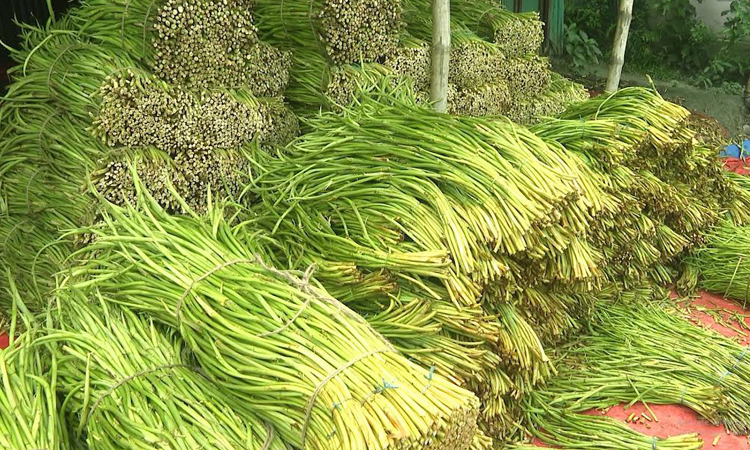News Flash
News Flash

CUMILLA, Sept 17, 2025 (BSS) - The export of taro stems from Cumilla's Barura Upazila is emerging as a promising source of foreign currency earnings, with shipments reaching international markets including the Middle East, the United States, the United Kingdom and several European countries.
Thanks to commercial-scale farming and streamlined supply chains, the upazila is exporting over 80 tons of taro stems daily. This surge in exports is translating into substantial foreign currency inflows, with monthly earnings estimated between USD 250,000 and 300,000 alongside generating jobs locally.
Talking to BSS, local taro stem farmer Abdul Matin said that they no longer have to go to the market themselves. "More than fifty traders in the upazila buy thick stems at Taka 45-50 per kilogram while thin stems at Taka 25-30, which are then transported to Dhaka and Chattogram by truck in the evening," he said.
He added, "From there, agencies purchase the selected taro stems for export abroad, while the rest are sold in local markets."
Local exporters said the global appetite for Bangladeshi taro stems is growing steadily, driven by diaspora communities and health-conscious consumers abroad. The export boom has also catalyzed employment generation in farming, packaging, logistics and freight services across Barura.
Agricultural economists viewed this success as a model for rural export diversification, highlighting the potential of non-traditional crops to contribute meaningfully to the country's foreign currency reserves and inclusive economic growth.
On-site visit revealed that during the current season, taro and its stems have been cultivated on more than 100 hectares of land in Barura, including Aganagar, Bhabanipur, Khoshbash, and Shilmuri unions, creating employment for thousands of people in the upazila. Local small traders collect taro and stems from farmers' homes daily.
The rising demand both at home and abroad, along with higher profit compared to production costs, has encouraged farmers to cultivate taro commercially. Once planted, it yields for nine months of the year.
However, farmers claimed that middlemen take a portion of their profits, requesting the authorities concerned to create the opportunity to sell the taro stems directly to exporters.
Experts said that scientific pest control and the fertile soil of the region contribute to the high quality of taro stems. The upazila produces over 80 tons of stems daily, valued at approximately Taka 30-32 lakh.
Md. Golam Sarwar Bhuiya, Upazila Deputy-Assistant Agriculture Officer, said farmers cultivate taro stems in clean environments and use zinc in the fields, ensuring good taste and preventing irritation in throat during consumption.
Several local taro stem growers confirmed that many farmers in Barura are now interested in cultivation due to low cost and high profit.
Local taro stem cultivator Arshad Mia said a sharp rise in demand for both taro and its stems, spurring increased cultivation across the region.
Farmers from neighboring upazilas and districts are now sourcing saplings from Barura to join the growing trend, he said, mentioning that with targeted government support, the sector could scale up significantly to unlock higher export volumes and greater profit margins for growers.
Several vegetable exporters said that taro and stems produced in Barura are packaged in Dhaka and exported by air to at least 25 countries, mostly to Dubai, Saudi Arabia, Qatar, Bahrain, and almost all Middle Eastern countries. They are also sent to the United States, the United Kingdom, and most European countries. Bangladesh earns at least USD 250,000 and 300,000 per month from this trade.
Sheikh Azizur Rahman, Additional Director of the District Agriculture Department, said taro and stem cultivation has seen notable expansion in recent months.
Export demand has enabled marginal farmers to secure competitive prices for their produce, he said, adding that wholesalers now procure stems directly from the fields, significantly lowering transportation costs for growers.
Both the Upazila and District Agriculture Offices are actively overseeing the cultivation and export process, while offering technical support and advisory services to ensure quality and sustainability, said Azizur Rahman.